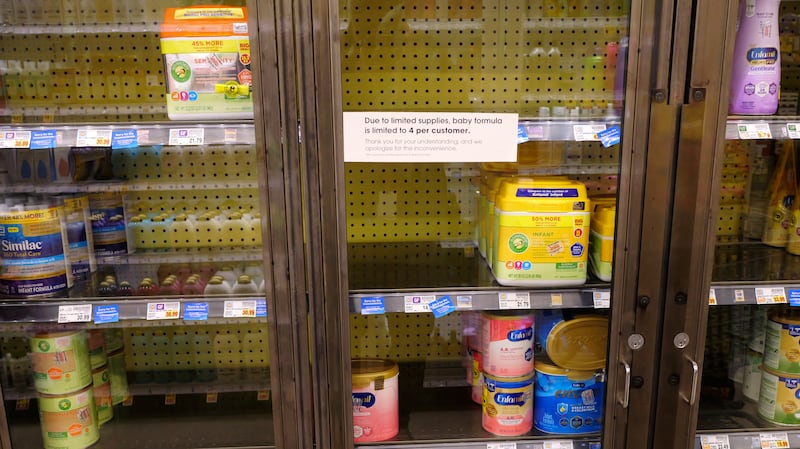The infant formula shortage has reached beyond infants to impact a group of vulnerable children who require a specific nutritional formula because of medical problems. Two kids who fit this description were recently hospitalized in Tennessee.
The New York Times reported that both children have short bowel syndrome, which impedes the absorption of nutrients. According to the Mayo Clinic, babies can be born with a short small intestine or it can be damaged and then surgically removed or shortened. The small intestine is where most nutrients are absorbed, so those with the syndrome rely on specialized formulas — in this case, EleCare, an amino-acid-based product that is one of the family of formulas made by Abbott Nutrition.
Abbott Nutrition shuttered its plant in Sturgis, Michigan, amid concerns its formula was implicated in cases of an unusual but serious infection that sent several babies to the hospital. Two died. The formula manufacturer also issued a voluntary recall of some of its products, which contributed to bare store shelves. A strained supply chain was already pressuring the amount of baby formula available.
Both the Centers for Disease Control and Prevention and Abbott Nutrition said the strains of cronobacter sakazakii found in the Abbott plant did not match the bacteria that sickened those children. But because bacteria was found in the plant, though not in products, that can be deadly for infants, Abbott Nutrition and the Food and Drug Administration reached an agreement on steps the formula manufacturer must take to reopen its plant, which could happen in as little as two weeks if a federal judge signs off on the agreement.
Dr. Mark Corkins, a pediatric gastroenterologist at Le Bonheur Children’s Hospital in Memphis, where the two children with short bowel syndrome were hospitalized, told The New York Times that each of the children needs amino acids that are key to EleCare’s formulation.
“Dr. Corkin called it the worst crisis he had experienced in his medical career,” the article noted. “He said there had recently been an increase in calls from families whose children have disabilities or medical conditions that require them to be on specific formulas.”
Because other formulas didn’t meet their needs, the children in Tennessee experienced challenges like dehydration and diarrhea. One of the kids, a preschooler, has been hospitalized since late April. The other, a toddler, is now reportedly home.
Corkin told CNN that patients who were using the EleCare formula were switched to other formulas made by smaller manufacturers, but those have now also run out. And other kinds of formulas with different proteins didn’t work, so the children became dehydrated.
Even in the hospital, nutrition is a challenge, he noted. “In the hospital, we give them IV fluids and the other thing we give them is IV nutrition. That’s not ideal.”
The Food and Drug Administration said Monday that it will simplify the process of importing certain infant formulas to help ease the ongoing crisis.
But The Wall Street Journal noted that even with expedited processing, it could be weeks before approved imported products are on U.S. store shelves, citing an unnamed FDA official. “Manufacturers will first have to apply with the agency to be able to ship their products to the U.S., and then the agency will have to conduct a review to assure quality control and safety,” the article said.
The rule changes on imports are temporary and would expire in 180 days.
Abbott is already importing products to the United States from its plant in Ireland and said it will continue to do so, at least for now.


